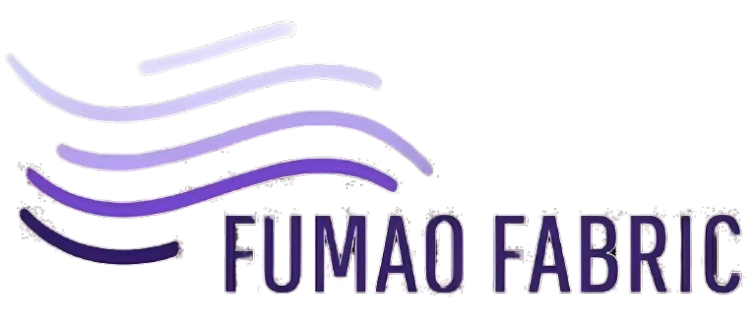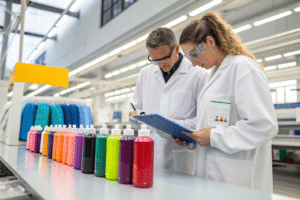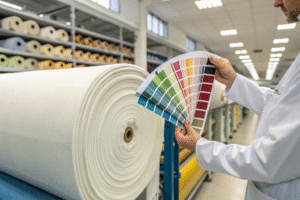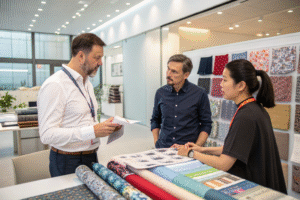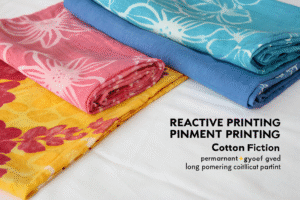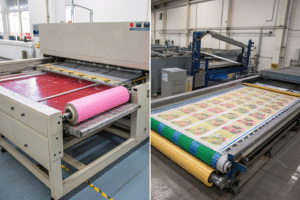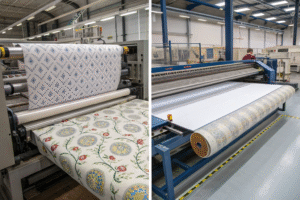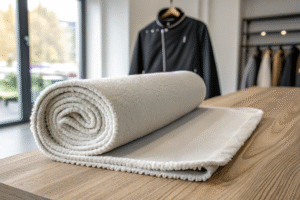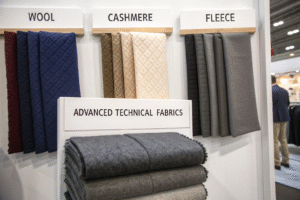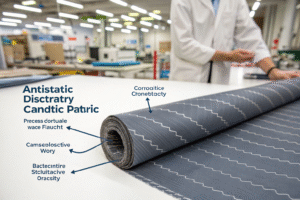Abrasion can make or break a bag. Backpacks and travel gear are constantly exposed to friction—from rubbing against clothing, dragging on the ground, or repeated packing and unpacking. While a fabric may look durable at first glance, without proper abrasion resistance, it could quickly wear down—leading to complaints, returns, and lost customers.
Abrasion testing is the most reliable way to predict a fabric’s long-term performance for backpacks and bags. It ensures your products remain durable, maintain their aesthetic, and comply with market-specific standards.
As a textile manufacturer, I’ve worked with dozens of global bag brands. In this post, I’ll explain how abrasion tests work, which standards you should care about, and how we help clients choose the right fabrics for rugged use.
What Is Abrasion Testing and How Does It Work?
Abrasion testing simulates years of real-life wear in just hours. It helps brands predict how a fabric will hold up under friction from daily use. Different markets and buyers require different testing methods.
Abrasion testing is a lab procedure that rubs fabric against a standard abrasive surface under pressure, measuring how many cycles it takes to show wear.

What Are the Main Types of Abrasion Tests?
The two most recognized tests in the bag industry are:
- Martindale Test – Used in Europe and Asia; rubs the fabric in a figure-eight motion.
- Wyzenbeek Test – Preferred in North America; uses a back-and-forth motion on cotton or wire mesh.
Both measure “cycles to failure” to rate a fabric’s resistance. A high-end Cordura® nylon for bags might reach 20,000–50,000 cycles.
You can see a clear comparison guide between the two methods for different use cases. We perform both in our Fumao QC lab.
Why Is It Important to Simulate Real-World Use?
Bag fabrics endure abuse: dragging on airport floors, rubbing on jacket seams, or even scraping on rocks during hiking. Testing mimics these conditions. Brands like Patagonia rely on these results to build gear that lasts. When our customers request sample development, abrasion resistance is among the top three requested properties—right after waterproofing and weight.
Which Backpack Fabrics Are Most Abrasion Resistant?
Some fabrics naturally resist abrasion better than others. The fiber content, weave structure, yarn twist, and finish all contribute to its performance.
Backpack and bag buyers often prioritize Cordura® nylon, ballistic polyester, and tightly woven blends for high abrasion resistance, especially in load-bearing zones like bottoms and straps.

How Does Cordura Nylon Compare to Regular Nylon?
Cordura® is a branded high-tenacity nylon that outperforms generic versions in abrasion and tear tests. For example, Cordura 500D can resist over 30,000 cycles in Martindale tests—making it a top pick for tactical and travel bags.
In contrast, standard 210D nylon or ripstop polyester might only reach 5,000–8,000 cycles unless specially coated or woven. We recommend using Cordura for base panels and straps, while mixing lighter fabrics for non-load areas.
Can Natural or Eco Fabrics Meet Abrasion Standards?
Yes, with enhancements. Organic canvas, hemp, or recycled polyester blends can reach commercial abrasion standards if woven densely and treated with PU coatings or wax finishes. For instance, Waxed canvas resists scuffing and aging well. Our in-house team helps test and apply abrasion-resistant coatings to eco fabrics, making them viable for modern sustainable gear.
What Standards Do International Buyers Require?
For export success, your fabrics must meet buyer-specific standards. A U.S. military client may demand 50,000 Wyzenbeek cycles, while a boutique European brand might be satisfied with 15,000 Martindale cycles.
Buyers in North America, Europe, and Japan each rely on different abrasion standards, which are usually outlined in their tech packs or product specifications.

What Do U.S. and EU Buyers Typically Expect?
- U.S. outdoor brands often use Wyzenbeek:
- Entry-level: 10,000–15,000 cycles
- Tactical gear: 30,000+ cycles
- EU fashion/outdoor brands use Martindale:
- Light use: 15,000+ cycles
- Heavy-duty: 30,000–50,000 cycles
The American Association of Textile Chemists and Colorists (AATCC) and ISO 12947 are the key testing bodies behind these standards. At Fumao, we test to both specs and provide full PDF reports for your records.
How Can You Ensure Compliance Before Bulk Production?
We recommend all clients request pre-production lab tests, especially when exporting to large retailers or institutional buyers. Our lab can simulate both Martindale and Wyzenbeek tests using customer-specified loads and abrasives. We provide digital photos and a QR report link. This ensures your PO isn't rejected after shipment.
How Can We Help You Choose the Right Fabric?
We know sourcing is more than just picking a pretty fabric. You need materials that will meet abrasion specs, ship fast, and keep your brand reputation intact. That’s where we come in.
At Fumao Fabric, we don’t just supply—we guide. We test, simulate, and recommend abrasion-proof fabrics based on your bag’s function, market, and budget.

What Is Our Abrasion Testing Process?
Here’s how we support you:
- Receive brief or sample
- Simulate wear zones on prototypes
- Test fabric using CNAS-accredited lab methods
- Compare results to target buyer specs
- Provide recommendations (e.g., use PU-coated oxford on base, Cordura on flap)
Clients like Decathlon and Lowe Alpine value our end-to-end lab support because they avoid costly post-shipment disputes.
What If You Want Custom or Eco-Friendly Fabrics?
We offer over 50+ abrasion-tested options including:
- RPET oxford with PU coating
- Waxed cotton canvas
- TPU-laminated hemp blends
- 900D recycled polyester
All fabrics can be previewed in our virtual showroom. You’ll also get access to pre-tested abrasion data and updated inventory reports.
Conclusion
Backpack and bag fabrics don’t just need to look strong—they need to prove it. Abrasion testing is the smartest way to confirm performance before production, and to align with buyer expectations in different markets. As a one-stop fabric manufacturer, Fumao helps you not only pass the tests—but choose materials that elevate your product’s reliability and reputation. Let’s co-create the next rugged bestseller, cycle by cycle.
